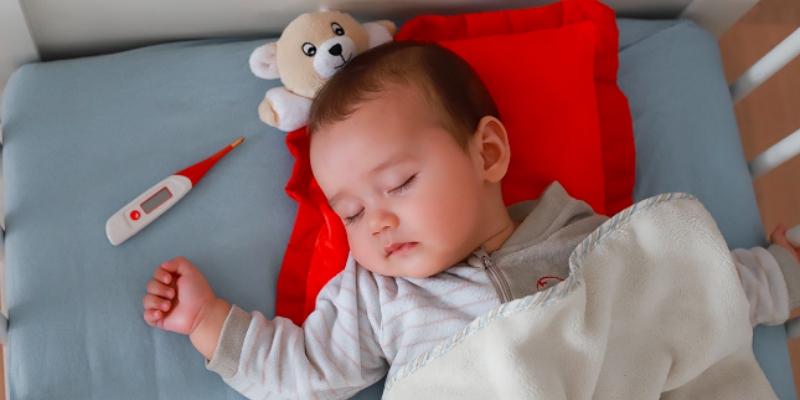
Signs of Fever in Infants and Children

Author - Dr. Pawan Deep Singh, M.B.B.S,DCH,DNB Pediatrics
Consultant of Paediatrics
Signs of Fever in Infants and Children
A fever is a temporary rise in body temperature. It is your body’s overall response to the infection. For adults, a fever may be uncomfortable. For infants, however, it may be a sign of serious infection. According to Dr Pawan Deep Singh, MBBS, DCH, DNB Paediatrics, the signs of fever in infants and children can be warning signs of certain diseases. Hence, the best paediatrician & neonatologist in Zirakpur recommends understanding fever in your children and knowing when to worry and visit the doctor.What is a Fever?
The normal body temperature of a person is around 37 degrees Celsius or 98.6 degrees Fahrenheit. It can increase or decrease throughout the day. A fever, however, occurs when the temperature goes beyond 100 degrees Fahrenheit. A fever in kids is called a low-grade fever when the temperature is between 100.4- to 102.2 degrees Fahrenheit and a high-grade fever is above 102.2 degrees Fahrenheit. Fever in infants and children is different from adults. Mostly, the fever goes on its own within two days. If, however, the fever continues, it is considered a warning sign.What Causes Fever in Babies?
A fever is not an illness but a symptom of an infection or illness. Having a fever is a sign that your body is fighting against an infection and that your immune system is active. In cases of babies, fever is mostly because of a viral infection or cold. Some lesser reasons include ear infections, pneumonia, or other serious diseases including meningitis. Hence, fever in children should not be taken lightly and addressed at the earliest.What are the Signs of Low-Grade Fever in Infants and Children?
The signs of fever in infants and children can vary depending on the child. The common signs of low-grade fever are:- Temperature between 100.4- 102.2 degrees Fahrenheit.
- Sweating.
- Poor sleeping.
- Shivering and chills.
- Dehydration.
- Weakness.
- Muscle aches.
- Headaches.
- No interest in playing.
- Less active than normal.
- Irritability.
What are The Signs of High Fever in Infants and Children?
A small increase in temperature can also be a cause of worry in infants and children. Hence, you should consult the best paediatric neurologist in Zirakpur at the earliest if the fever is about 100.4 degrees Fahrenheit. The symptoms to look out for are:- Diarrhoea or vomiting.
- Lethargic or acting differently from normal.
- Unexplained rashes.
- Trouble feeding and/or breathing.
- Decreased urination.
- Breathing issues.
- Abdominal pain.
Signs of Fever in Infants and Children: When Not to Worry?
When you are wondering which signs of fever in infants and children and when to worry, pay attention to the above-mentioned symptoms. Make sure that you always visit a doctor when there is a fever in babies less than 3 months old. For older kids, it is important to know when to monitor and when to relax. You may not need to worry if:- The fever lasts fewer than 3 to 5 days and the child is normal.
- The fever is due to a recent vaccination shot.
Related Blogs

Understanding Gestational Diabetes: Insights from Dr Shruthi Kalagara
Read More
Urinary Tract Infection (UTI) in Pregnancy
Read More
Early Pregnancy Care for New Pregnant Women: Expert Advice | Motherhood Hospitals
Read More
Body Positivity Tips Post C Section (Cesarean Delivery)
Read More
Vaginoplasty: Procedure, Cost, Risks & Benefits, Recovery
Read More
The Digital Dilemma: Exploring the Medical Implications of Technology on Child Development
Read More
How To Relieve Menstrual Cramps? - 8 Simple Tips
Read More
Benefits of Consuming Folic Acid Tablets For Pregnancy/During Pregnancy
Read More
Navigating Radiology: Ensuring Safe Imaging During Pregnancy
Read More
Navigating Radiological Tests During Pregnancy: Ensuring Safety for Mother and Child
Read MoreRequest A Call Back
Leave a Comment:
View Comments
Previous
Next
HELLO,
Stay update don our latest packages, offer, news, new launches, and more. Enter your email to subscribe to our news letter


 Toll Free Number
Toll Free Number








No comment yet, add your voice below!